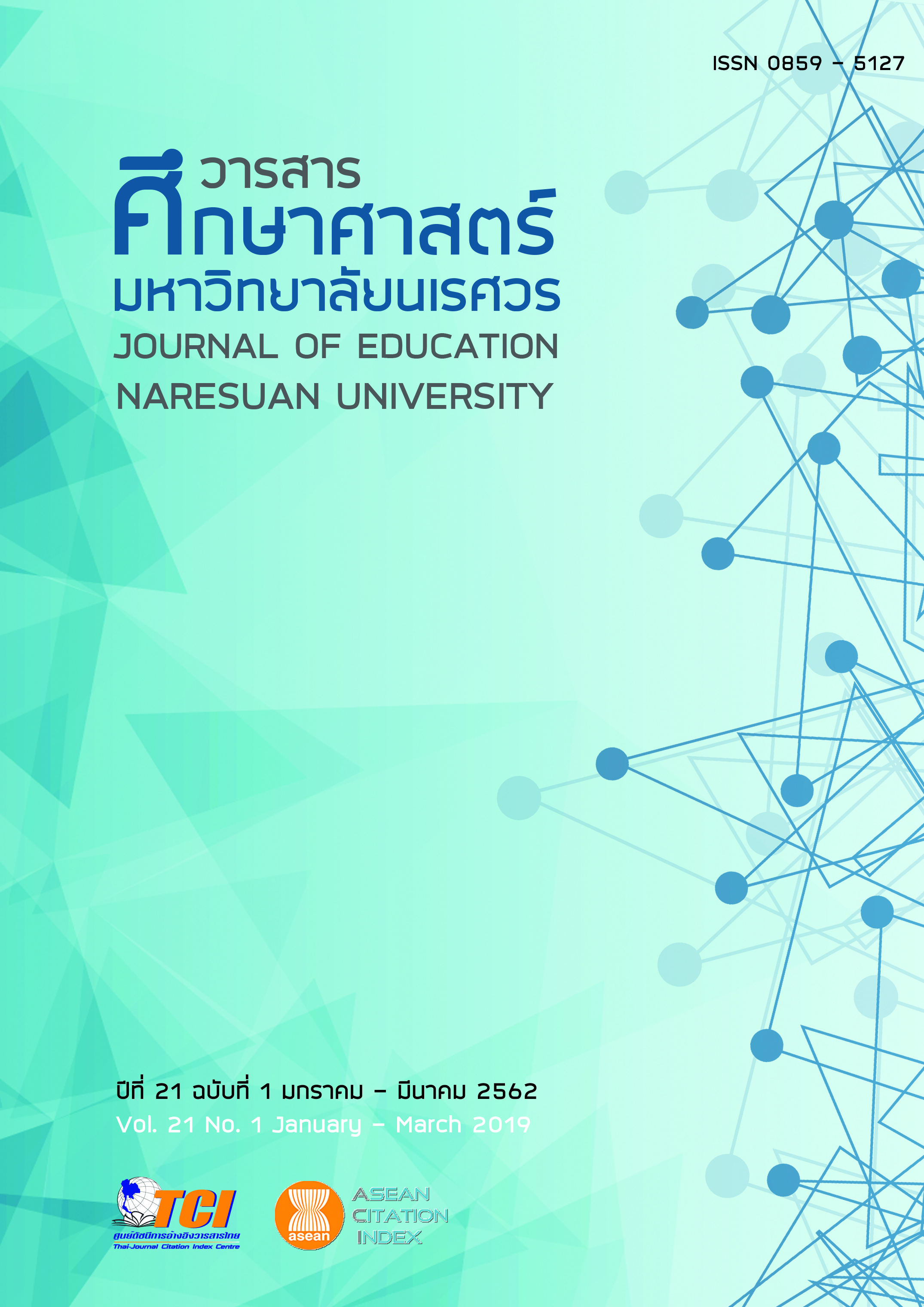การศึกษาผลสัมฤทธิ์ทางการเรียนวิชาฟิสิกส์ ทักษะการแก้โจทย์ปัญหาฟิสิกส์ และศึกษาเจตคติที่มีต่อวิชาฟิสิกส์ เรื่อง โมเมนตัมและการชนของนักเรียนชั้นมัธยมศึกษาปีที่ 5 ด้วยวิธีสอนแบบสืบเสาะหาความรู้ร่วมกับเทคนิคการแก้โจทย์ปัญหาของโพลยา (A STUDY OF PHYSICS ACHIEVEMENT PHYSICS PROBLEM SOLVING SKILL AND EDUCATION ATTITUDE FOR PHYSICS ON MOMENTUM AND COLLISION OF 11th GRADE STUDENTS USING INQUIRY METHOD OF TEACHING ENCHANCED BY USING POLYA’S PROBLEM SOLVING TECHNIQUE)
Main Article Content
Abstract
การวิจัยครั้งนี้ มีวัตถุประสงค์เพื่อเปรียบเทียบผลสัมฤทธิ์ทางการเรียนวิชาฟิสิกส์ ทักษะการแก้โจทย์ปัญหาฟิสิกส์และศึกษาเจตคติที่มีต่อวิชาฟิสิกส์ เรื่องโมเมนตัมและการชน ของนักเรียนชั้นมัธยมศึกษาปีที่ 5 ที่ได้รับการจัดการเรียนรู้ด้วยวิธีสอนแบบสืบเสาะหาความรู้ (5E) ร่วมกับแบบฝึกทักษะการแก้โจทย์ปัญหาวิชาฟิสิกส์โดยใช้เทคนิคการแก้โจทย์ปัญหาของโพลยากับการจัดการเรียนรู้ด้วยวิธีสอนแบบสืบเสาะหาความรู้ (5E) กลุ่มตัวอย่างในการวิจัยครั้งนี้เป็นนักเรียนแผนการเรียนวิทยาศาสตร์-คณิตศาสตร์ ชั้นมัธยมศึกษาปีที่ 5 โรงเรียนมกุฎเมืองราชวิทยาลัย ภาคเรียนที่ 2 ปีการศึกษา 2558 จำนวน 2 ห้องเรียน โดยการสุ่มแบบกลุ่ม (Cluster Random Sampling) มีกลุ่มควบคุม จำนวน 25 คน และกลุ่มทดลอง จำนวน 25 คน รวมทั้งสิ้น 50 คน เครื่องมือที่ใช้ในการวิจัยประกอบด้วยแผนการจัดการเรียนรู้ด้วยวิธีสอนแบบสืบเสาะหาความรู้ (5E) ร่วมกับแบบฝึกทักษะการแก้โจทย์ปัญหาวิชาฟิสิกส์โดยใช้เทคนิคการแก้โจทย์ปัญหาของโพลยาสำหรับกลุ่มทดลอง แผนการจัดการเรียนรู้ด้วยวิธีสอนแบบสืบเสาะหาความรู้ (5E) สำหรับกลุ่มควบคุม แบบทดสอบวัดผลสัมฤทธิ์ทางการเรียนวิชาฟิสิกส์ แบบทดสอบวัดทักษะการแก้โจทย์ปัญหาวิชาฟิสิกส์ และแบบวัดเจตคติที่มีต่อวิชาฟิสิกส์ วิเคราะห์ข้อมูลโดยใช้ค่าเฉลี่ย ส่วนเบี่ยงเบนมาตรฐาน การวิเคราะห์ความแปรปรวนร่วม (Analysis of Covariance) และการทดสอบที (t-test) ผลการวิจัย พบว่า
1. ทักษะการแก้โจทย์ปัญหาฟิสิกส์ของนักเรียนที่ได้รับการจัดการเรียนรู้ด้วยวิธีสอนแบบสืบเสาะหาความรู้ (5E) ร่วมกับแบบฝึกทักษะการแก้โจทย์ปัญหาวิชาฟิสิกส์โดยใช้เทคนิคการแก้โจทย์ปัญหาของโพลยาสูงกว่าการจัดการเรียนรู้ด้วยวิธีสอนแบบสืบเสาะหาความรู้ (5E) อย่างมีนัยสำคัญทางสถิติที่ระดับ .05
2. ผลสัมฤทธิ์ทางการเรียนวิชาฟิสิกส์ของนักเรียนที่ได้รับการจัดการเรียนรู้ด้วยวิธีสอนแบบสืบเสาะหาความรู้ (5E) ร่วมกับแบบฝึกทักษะการแก้โจทย์ปัญหาวิชาฟิสิกส์โดยใช้เทคนิคการแก้โจทย์ปัญหาของโพลยาสูงกว่าการจัดการเรียนรู้ด้วยวิธีสอนแบบสืบเสาะหาความรู้ (5E) อย่างมีนัยสำคัญทางสถิติที่ระดับ .05
3. เจตคติที่มีต่อวิชาฟิสิกส์ของนักเรียนที่ได้รับการจัดการเรียนรู้ด้วยวิธีสอนแบบสืบเสาะหาความรู้ (5E) ร่วมกับแบบฝึกทักษะการแก้โจทย์ปัญหาวิชาฟิสิกส์โดยใช้เทคนิคการแก้โจทย์ปัญหาของโพลยาสูงกว่านักเรียนที่ได้รับการจัดการเรียนรู้ด้วยวิธีสอนแบบสืบเสาะหาความรู้ (5E) อย่างมีนัยสำคัญทางสถิติที่ระดับ .05
A STUDY OF PHYSICS ACHIEVEMENT PHYSICS PROBLEM SOLVING SKILL AND EDUCATION ATTITUDE FOR PHYSICS ON MOMENTUM AND COLLISION OF 11th GRADE STUDENTS USING INQUIRY METHOD OF TEACHING ENCHANCED BY USING POLYA’S PROBLEM SOLVING TECHNIQUE
The purpose of this research were to compare physics learning achievement, problem solving skills and to study education attitude towards physics on Momentum and Collision of 11th Grade Students 1) using Inquiry Method (5E) enhanced by using Polya’s problem solving technique and 2) using Inquiry Method (5E). The samples of this research were 2 classes of 11th Grade Students of science-math program of Makudmuang Rajchawittayalai School in the second semester, academic year 2015, divided into two groups: a control group of 25 students and the experimental group of 25 students using Cluster Random Sampling. Instruments used in the study were the Inquiry Method (5E) lesson plan with exercises for enhancing problem solving skills, using Polya’s problem solving technique for the experimental group, the Inquiry Method (5E) lesson plan for the control group, physics achievement test, physics problem solving skills test and education attitude test towards physics. Data were analyzed by using mean, standard deviation, Analysis of Covariance, and t-test. The results showed that:
1. Students’ problem solving skills taught by the Inquiry Method (5E) enhancing problem solving skills by Polya’s problem solving technique were significantly statistic different with those taught by the Inquiry Method (5E) alone at .05 level.
2. Students’ physics learning achievement taught by the Inquiry Method (5E) enhancing problem solving skills by Polya’s problem solving technique were significantly statistic different with those taught by the Inquiry Method (5E) alone at .05 level.
3. Students’ education attitude towards physics taught by the Inquiry Method (5E) enhancing problem solving skills by Polya’s problem solving technique were significantly statistic different with those taught by the Inquiry Method (5E) alone at .05 level.
Article Details
The owner of the article does not copy or violate any of its copyright. If any copyright infringement occurs or prosecution, in any case, the Editorial Board is not involved in all the rights to the owner of the article to be performed.
References
Chuenchob, A. (2006). Development of physics achievement and physics problem solving skill of Mathyomsuksa students using inquiry method of teaching enhanced by Polya' s problem solving technique (Master thesis). Chonburi: Burapha University. [in Thai]
Dachakupt, P. (2001). Student centered: concept and teaching technique 1. Bangkok: The Master Group Management. [in Thai]
Department of Academic Affairs. (2003). Organizing science subjects in science subjects. Bangkok: Teachers Council Lat Phrao. [in Thai]
Kammit, A. (2012). Development of instructional package focusing on SQR curriculum and SQR curriculum substances and properties of substances for Prathomsuksa 6 students (Master thesis). Chonburi: Burapha University. [in Thai]
Khammani, T. (2007). Science of teaching (5th ed.). Bangkok: Dan Sutra Printing. [in Thai]
Kulpuang, J., Chauvatcharin, N., & Sirisawatlnthong, C. (2016). A study of biology learning achievement and attitude towards 5Es – learning cycle with active learning activities of 12th grade students. Journal of Education Naresuan University, 16(3), 265 – 275. [in Thai]
Laohapaiboon, P. (1999). Science teaching (3th ed.). Bangkok: Thaiwattanapanit. [in Thai]
Ministry of Education. (2007). Educational reform of the ministry of education. Bangkok: TSB Products. [in Thai]
National Education Commission. (1999). National education act 1999. Bangkok: Prikwarn Graphic. [in Thai]
Rodrangka, W. (1997). Process-oriented science teaching. Bangkok: Institute of Academic Development. [in Thai]
Saiyos, L. and Saiyos, A. (1995). Educational research techniques (4th ed.). Bangkok: Suviriyasarn. [in Thai]
Sripon, P. (2013). The study of learning achievement and scientific attitude in chemistry for grade 10 students using the inquiry cycle (5E) learning method together with the cooperative learning method STAD technique (Master thesis). Chonburi: Burapha University. [in Thai]
Sriwilai, W. (2013). A Construction of Learning Activities Packages in Plant of Science Based on Subjects Inquiry Cycle (5E) Learning Method and STAD for Grade 4 Students (Master thesis). Chonburi: Burapha University. [in Thai]
Suraorad, P. (2000). Think brain. Bangkok: Department of Curriculum and Instruction, Faculty of Education, Srinakharinwirot University. [in Thai]


